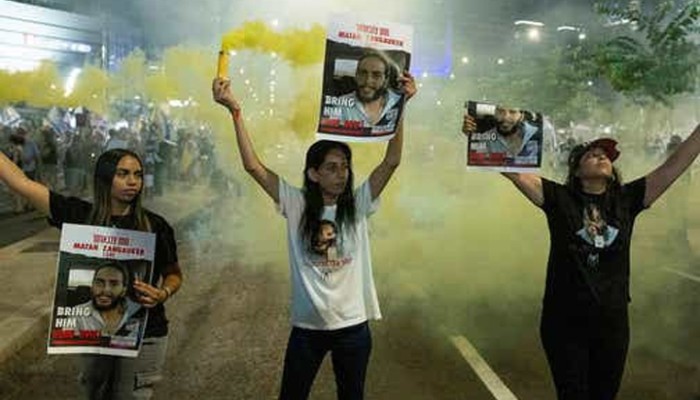
Israel Seeks Changes to Cease-Fire Deal with Hamas
Staff Report , Published: July 27, 2024, 9:07 am

Prime Minister Benjamin Netanyahu is reportedly seeking alterations to the current cease-fire and hostage deal with Hamas, potentially putting truce talks in jeopardy. A senior Israeli negotiator told Haaretz that Netanyahu is deliberately trying to create a crisis in the negotiations, believing that he can secure better terms. "Netanyahu is knowingly trying to put the negotiations in crisis because he thinks he can improve positions. He has hinted to that effect in recent conversations," the negotiator said. This move, however, is seen as an uncalculated risk with the lives of hostages.
Israel is seeking changes to the existing proposal, aiming to implement a vetting mechanism for displaced Palestinians returning to northern Gaza. This demand has complicated the final agreement, as Hamas has rejected this new condition. A Western official confirmed that Israel wants to screen displaced Palestinians to prevent support for Hamas fighters who remain in the area. The Palestinian and Egyptian sources corroborated that Hamas refused the demand, viewing it as an unacceptable Israeli presence in Gaza.
Netanyahu's stance has also influenced international discussions. During a recent meeting in Washington, D.C., President Biden met with families of hostages held by Hamas. Ruby Chen, whose son Itay's body is held by Hamas, reported that Biden provided hope for imminent action, saying, "Biden gave us hope that something will happen in the coming days."
Despite these assurances, the White House acknowledges remaining gaps in cease-fire talks. National Security Council Spokesperson John Kirby emphasized the urgency, stating, "We need to get there soon." The leaders of Australia, New Zealand, and Canada have also called for an immediate cease-fire in Gaza.
CIA Director William Burns is set to meet with senior officials from Israel, Qatar, and Egypt in Rome to push for a cease-fire and hostage release deal. According to reports from Axios, the aim is to secure a resolution amidst ongoing negotiations.
In parallel, Vice President Kamala Harris has been vocal about ending the conflict. In a press conference, she reiterated her commitment to Israel's security but also emphasized the need to end the war in a manner that protects innocent civilians and allows Palestinians to exercise their rights. "It is time for this war to end and end in a way where Israel is secure, all the hostages are released, the suffering of Palestinians in Gaza ends, and the Palestinian people can exercise their right to freedom, dignity, and self-determination," Harris stated.
However, a senior Israeli official criticized Harris's comments, suggesting that they might give Hamas the impression of a divide between the U.S. and Israel, potentially hindering the deal. This criticism came shortly after Donald Trump, a Republican presidential candidate, urged Netanyahu to conclude the war quickly to mitigate negative publicity for Israel.
During discussions with Harris and National Security Advisor Jake Sullivan, Netanyahu expressed objections to U.S. sanctions against Israeli settlers. An Israeli official indicated that these discussions ended without agreements, and it remains unclear whether the U.S. intends to sanction far-right ministers Itamar Ben-Gvir and Bezalel Smotrich.
In a related development, Britain announced it would not challenge the International Criminal Court's jurisdiction to issue arrest warrants for Netanyahu and Defense Minister Yoav Gallant. This decision has disappointed Israeli officials, who argue that it undermines justice and the right of democracies to combat terrorism.
On the ground in Gaza, the humanitarian situation remains dire. The World Health Organization is sending over one million polio vaccines to prevent outbreaks among children after the virus was detected in sewage samples. The conflict has resulted in significant casualties, with the Hamas-controlled Health Ministry reporting at least 39,175 Palestinians killed and 90,403 wounded since the war began.
The situation in the West Bank is also tense, with Palestinian security forces clashing with armed groups and encountering protests during an arrest operation. Additionally, a West Bank Hamas leader died in Israeli custody, further escalating tensions.
In Israel, the IDF continues its military operations in Gaza, with IDF Chief of Staff Herzl Halevi emphasizing the importance of the hostage deal as a top priority. Meanwhile, domestic unrest persists, with anti-war demonstrations and legal actions against protesters. The conflict has also seen cross-border violence with Lebanon, where Israeli strikes have resulted in casualties.
The ongoing war has placed immense pressure on Netanyahu's government, which is also dealing with significant domestic political and social crises. These challenges arise from controversial judicial reforms and escalating violence between West Bank Palestinians and Israeli settlers.